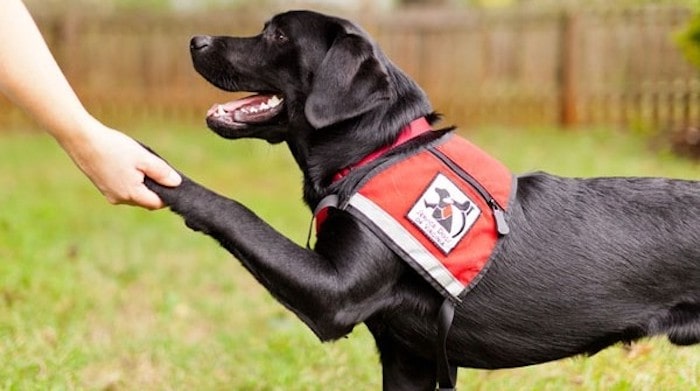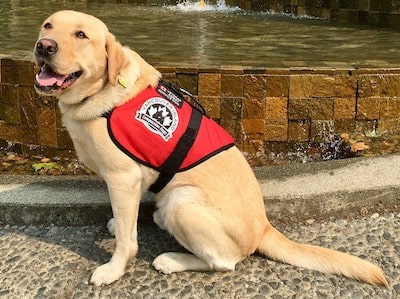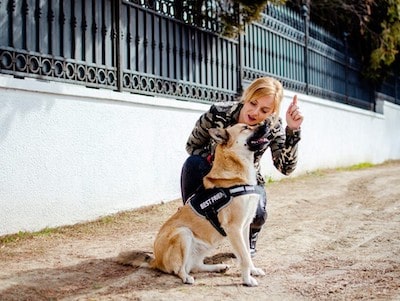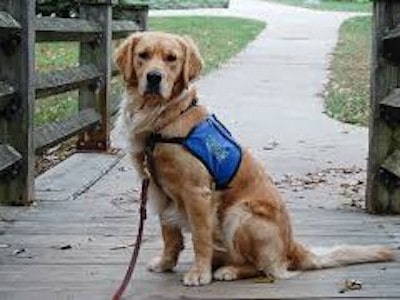Importance of reliable service dog training
When it comes to service dogs, reliable training is of utmost importance. These remarkable canines play an invaluable role in the lives of individuals with disabilities, assisting them with daily tasks, providing emotional support, and even saving lives.
However, without proper training, a service dog may not be able to perform its duties effectively or meet the specific needs of its handler. That’s why finding a reputable and trustworthy service dog training program is crucial.
Reliable service dog training ensures that these extraordinary animals are prepared to fulfill their responsibilities with precision and care. A well-trained service dog can offer a sense of independence and freedom to individuals who may face various challenges due to disabilities.

Whether it’s guiding a visually impaired person, alerting someone with diabetes to dangerous changes in blood sugar levels, or providing stability and support for an individual with mobility issues, these dedicated dogs make a significant difference in the lives of their handlers.
Beyond the practical assistance they provide, service dogs also offer emotional support and companionship. They can contribute to improved mental well-being and reduced stress levels for their handlers.
However, to achieve these remarkable outcomes, service dogs must undergo comprehensive and reliable training that prepares them for the specific tasks they will perform.
In this article, we will delve into the importance of reliable service dog training and explore the different aspects that make a training program trustworthy. We will also discuss how to find service dog training options in your local area, what to look for in a training program, and the questions you should ask potential trainers.
By the end of this article, you’ll have a clear understanding of what constitutes reliable service dog training and how to find the right program for your needs.
So, let’s embark on this journey to discover the world of service dog training together and unlock the incredible potential these specially trained canines bring to the lives of their handlers.
Understanding Service Dogs
Service dogs play a crucial role in the lives of many individuals with disabilities. These highly trained canines assist their handlers in performing a variety of tasks, providing both practical support and emotional comfort. To fully appreciate the importance of service dogs, it is essential to understand what they are, the different types available, and the legal rights and regulations surrounding their use.
What is a service dog?
A service dog is a specially trained canine that is individually trained to perform tasks for a person with a disability. These tasks are directly related to the person’s disability and are designed to mitigate the challenges they face in their daily lives.
Service dogs are not mere pets; they are working animals that provide invaluable assistance to individuals with physical, sensory, psychiatric, or intellectual disabilities.

Different types of service dogs
Service dogs are trained to assist individuals with a wide range of disabilities. Here are some of the different types of service dogs:
- Guide dogs: These dogs are trained to assist individuals who are blind or visually impaired. They navigate obstacles, provide guidance, and ensure their handlers’ safety in various environments.
- Hearing dogs: These dogs are trained to alert individuals who are deaf or hard of hearing to important sounds such as doorbells, fire alarms, or approaching vehicles.
- Mobility assistance dogs: These dogs are trained to help individuals with mobility impairments by performing tasks like retrieving dropped items, opening doors, or assisting with balance and stability.
- Medical alert dogs: These dogs are trained to detect changes in their handler’s body odor or behavior that may indicate a medical issue, such as an impending seizure or a drop in blood sugar levels.
- Psychiatric service dogs: These dogs provide support for individuals with psychiatric disabilities, such as post-traumatic stress disorder (PTSD), anxiety disorders, or depression. They can provide comfort, interrupt panic attacks, and perform other tasks to mitigate their handler’s symptoms.
Legal rights and regulations
Service dogs are protected by laws that grant their handlers certain rights and privileges. In the United States, the Americans with Disabilities Act (ADA) ensures that individuals with disabilities have the right to be accompanied by their service dogs in public places, including restaurants, stores, and transportation.
These laws prohibit discrimination against service dog handlers and require businesses and establishments to make reasonable accommodations for them.
It is important to note that there are specific guidelines and regulations surrounding the use of service dogs. For instance, service dogs must be well-behaved and under control at all times. They should be harnessed, leashed, or tethered unless doing so interferes with their tasks or the handler’s disability.
Additionally, service dogs are not required to wear identifying vests or tags, as their training and behavior are the determining factors of their status.
Understanding the role and rights of service dogs is crucial for both individuals with disabilities and the general public. By recognizing the importance of these highly trained animals, we can create a more inclusive and accessible society.
If you are interested in getting a service dog or finding reliable training options, continue reading to discover how to find service dog training near you.
Finding Service Dog Training Near You
When it comes to finding reliable service dog training near you, there are several steps you can take to ensure you find the best program for you and your furry companion. Researching local options, evaluating training programs, and reading reviews and testimonials are essential in making an informed decision.
Researching Local Options
Begin your search by researching the local options available to you. Start by searching online for service dog training programs in your area. This can be as simple as entering “service dog training near me” into a search engine. You may also want to ask your veterinarian, friends, or family members for recommendations.
Make a list of potential training programs and gather information about each one. Look for certified trainers who have experience specifically in service dog training. Check if the programs offer individualized training plans, as every dog has unique needs. Consider the location and accessibility of the training facility, as well as the availability of classes that fit your schedule.

Evaluating Training Programs
Once you have a list of potential programs, it’s time to evaluate them further. Look for programs that use positive reinforcement methods in their training approach, as this has been shown to be the most effective and humane way to train dogs. Avoid programs that rely on harsh or punitive methods.
Consider the reputation and experience of the trainers. Look for programs that have certified trainers who have undergone extensive training themselves. Check if the trainers have experience with the specific type of service dog you are looking to train, whether it’s a guide dog, hearing dog, or mobility assistance dog.
Reading Reviews and Testimonials
To get a better understanding of the quality of a training program, take the time to read reviews and testimonials from previous clients. This can provide valuable insights into the experiences of others who have used the program.
Look for reviews that mention the effectiveness of the training, the professionalism of the trainers, and the overall satisfaction of the clients. Pay attention to any negative reviews or complaints and consider if they are isolated incidents or a recurring theme.
Reading reviews and testimonials can give you a sense of what to expect from a particular training program and help you make an informed decision.
By researching local options, evaluating training programs, and reading reviews and testimonials, you can find a reliable service dog training program that meets your needs and sets you and your loyal companion on the path to success.
Puppy training near me and therapy dog training near me are also popular options you may want to consider in your search for the perfect training program.
Qualities of Reliable Service Dog Training
When it comes to reliable service dog training, there are several key qualities that you should look for in a program. These qualities ensure that your service dog receives the best possible training to fulfill their important role in your life. Here are some essential qualities to consider:
Certified trainers
One of the most crucial aspects of reliable service dog training is the presence of certified trainers. These professionals have undergone rigorous training themselves to become experts in understanding and training service dogs. Their certification serves as a testament to their knowledge and expertise in this specialized field.
Certified trainers possess a deep understanding of canine behavior and psychology. They have the necessary skills to identify and address the unique needs of each individual service dog. With their extensive knowledge, they can tailor training programs to suit the specific requirements of different service dog tasks.
Individualized training plans
Reliable service dog training programs recognize that each dog is unique and has different training needs. Therefore, they prioritize individualized training plans. These plans are tailored to the specific strengths, weaknesses, and goals of each service dog.
By creating personalized training plans, the trainers can focus on the areas where the dog requires the most attention. Whether it’s obedience training, task-specific skills, or public access training, an individualized approach ensures that the dog receives the training necessary to excel in their role as a service dog.

Positive reinforcement methods
Positive reinforcement is a widely recognized and effective training method for dogs. Reliable service dog training programs emphasize the use of positive reinforcement techniques. This means that trainers reward desired behaviors with treats, praise, or play, rather than relying on punishment or harsh corrections.
Positive reinforcement not only motivates service dogs but also strengthens the bond between the dog and their handler. It creates a positive and enjoyable learning environment, making the training process more engaging and effective. By using rewards and encouragement, trainers can shape the desired behaviors and reinforce them consistently.
Ongoing support and follow-up
Another important quality of reliable service dog training is the provision of ongoing support and follow-up. Training doesn’t end once the initial program is completed; it is an ongoing process. Service dogs and their handlers may encounter new challenges or require additional guidance even after the formal training period.
A reputable training program understands the significance of continued support. They offer resources, guidance, and advice to handlers as they navigate real-world situations with their service dogs.
Whether it’s addressing new tasks, fine-tuning existing skills, or troubleshooting any issues that may arise, ongoing support ensures that the service dog and their handler can work together seamlessly.
By seeking out a service dog training program with certified trainers, individualized training plans, positive reinforcement methods, and ongoing support, you can ensure that your service dog receives the highest quality training possible. These qualities are essential for building a strong foundation and enabling your service dog to excel in their invaluable role.
Questions to Ask Potential Service Dog Training Programs
Understanding the training philosophy of a program is crucial in determining whether it aligns with your own beliefs and goals. Does the program emphasize positive reinforcement techniques such as rewards and praise, or does it rely on harsher methods? Look for a program that prioritizes the well-being and happiness of the dog, as this approach tends to yield better results in the long run.
Understanding the training philosophy of a program is crucial in determining whether it aligns with your own beliefs and goals. Does the program emphasize positive reinforcement techniques such as rewards and praise, or does it rely on harsher methods? Look for a program that prioritizes the well-being and happiness of the dog, as this approach tends to yield better results in the long run.
Observing a training session can offer valuable insights into the program’s methods and effectiveness. Ask if you can witness a training session to get a firsthand look at how the trainers interact with the dogs. This will allow you to assess their expertise, professionalism, and the overall atmosphere of the training environment. Additionally, observing a session can help you gauge whether the training techniques employed are suitable for your dog’s specific needs.
Service dogs can be trained to perform a wide range of tasks depending on the individual’s needs. Ask the training program about the specific tasks they can train your service dog for. Whether it’s guiding individuals with visual impairments, providing support for individuals with mobility challenges, or assisting individuals with psychiatric disabilities, a reputable program will have experience in training dogs for various tasks. Make sure the program can accommodate your specific requirements and goals.
Asking these questions will empower you to make an informed decision when selecting a service dog training program. Remember, finding the right program is crucial for the successful development of your service dog and the overall well-being of both you and your canine companion.
Conclusion
In conclusion, finding reliable service dog training is crucial for ensuring the success and well-being of both the dog and the handler. By investing time and effort into researching and evaluating local options, individuals can find the perfect training program for their specific needs.
Certified trainers who employ individualized training plans and positive reinforcement methods are the hallmarks of reliable service dog training. Ongoing support and follow-up are also essential for the continued progress and development of the service dog.
When considering potential service dog training programs, it is important to ask key questions to gain a deeper understanding of their training philosophy and methods. Inquiring about the duration of the training process and requesting to observe a training session can provide valuable insight into the program’s effectiveness.
Furthermore, understanding the types of tasks that can be trained for is crucial in ensuring that the service dog is equipped to meet the specific needs of the handler.
Whether it’s assisting with mobility, alerting to medical conditions, or providing emotional support, a well-trained service dog can make a significant difference in the lives of those who rely on their assistance.
To further enhance your knowledge and understanding of dog training, consider exploring other related topics such as puppy training near me, clicker training for dogs, agility training for dogs, leash training for dogs, behavior training for dogs, dog obedience classes near me, therapy dog training near me, private dog trainers near me, crate training for dogs, or dog training for separation anxiety.
Remember, service dogs are not just pets; they are highly trained and dedicated companions who provide invaluable assistance to individuals with disabilities. By finding reliable service dog training near you, you can embark on a journey towards a stronger bond and a more fulfilling life with your service dog.

Ellis is a retired veterinary technician and full-time contributor at DogLovesBest. He likes writing about pet health care tips and reviews the products that are useful for fidos on a daily basis.
Ellis also guardians a Siberian husky, Nova, and a cat named Shilly. They all live happily with his wife Ammy, and both the dogs on a seaside apartment in Queens, NY.
